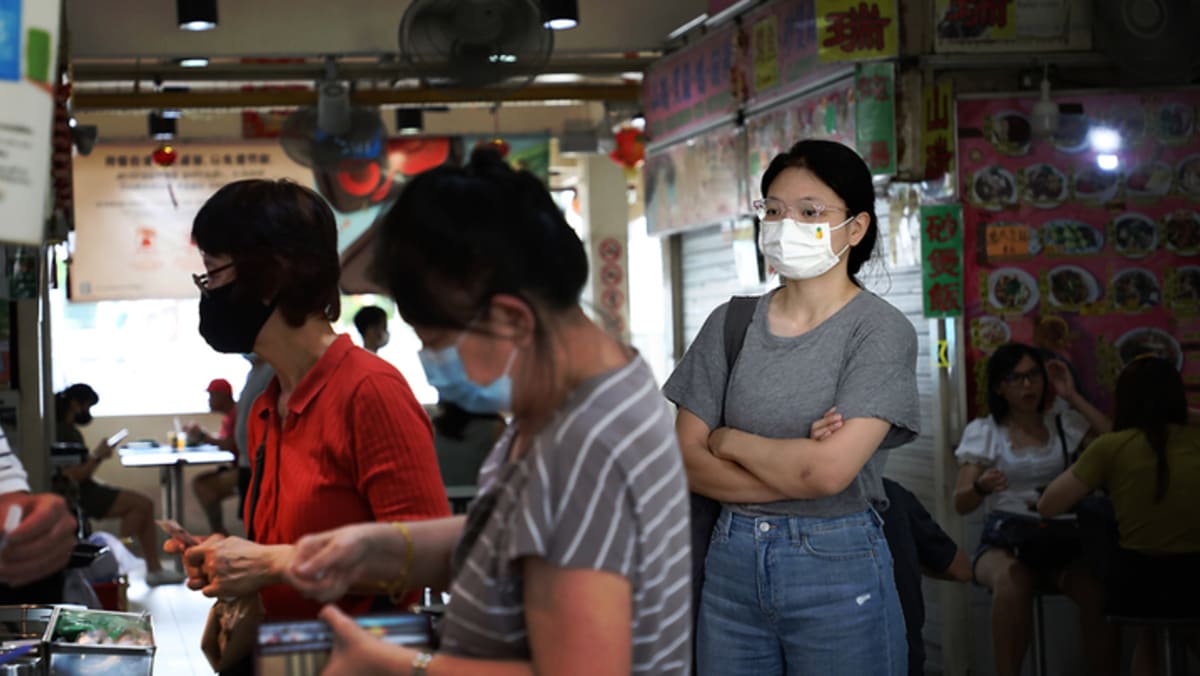
 By
By
Wong Pei Ting
TODAY senior journalist Wong Pei Ting during a bouldering workout. This was part of her routine until Covid-19 restrictions did not allow her to do this for a period. Photo: Nuria Ling/TODAY
In my case, before the episode with the woman, I had been going about life for slightly more than a month without my newfound post-pandemic routine of bouldering, an indoor type of rock climbing, twice or thrice a week, since indoor gyms had been ordered to shut.
Mr Nair also highlighted several pandemic-specific factors that could have compounded the problem. Mask-wearing, for example, obscures facial expression, making it easy for people to misconstrue glances as stares. Economic anxiety and constant reminders of the impermanence of life in the news could also play a part.
Psychotherapist Nicole Chew-Helbig said that rage is often mistaken as anger, but it is really “anger stuffed away”. Anger is a calm, necessary and constructive emotion that can be directed, but rage is “pure destruction”.
This reminded me that many of us had been suppressing our sense of loss by telling ourselves: “I shouldn’t be sad. I have a job. I am healthy. My family is healthy.”
Mr John Shepherd Lim, the chief wellbeing officer of Singapore Counselling Centre, said that underlying layers of social angst are affecting even those largely unaffected by the Covid-19 crisis.
This angst, he added, is what sociologists may call a state of anomie, where societal norms and values are broken down due to high levels of uncertainty in society and people. It can easily result in public outbursts, “much like a spark that sets off a powder keg”, he said.
PRACTICAL TIPS
Is there anything we can do to keep this potentially explosive aspect of our lives in check?
Mr Lim said that although it might seem overly simplistic, deep breathing is an effective way to help us calm down, because it slows our heart rate and tells the brain to relax and the body to loosen up.
His centre recommends the “4-2-6” breathing technique: Breathe in deeply for four counts, hold for two counts, then exhale fully for six counts. This briefly diverts our attention from the source of anger and gives ourselves a time-out before facing the situation.
We may also calm down by stepping away from the person or situation momentarily to give us some space to breathe, he added.
Agreeing, Mr Nair advises counting to 10 before reacting or using our non-dominant hand to type on the phone to slow down the thought process.
The experts highlighted the importance of examining the root of the rage event. Ms Chew-Helbig said that it can be something wholly unrelated to the trigger event such as childhood trauma, when you felt trapped or abandoned.
Mr Lim said that if the root situation is controllable, we can take action to improve the situation or relationship so that we decrease our negative emotionality in the long run.
And if the root situation is uncontrollable, such as when others continue to think poorly of us despite efforts to explain or if the pandemic roils on, “letting go” would help, he said.
Learning to let go, he stressed, is not suppressing our emotions because it requires us to address the situation at hand.
“Rather than disregarding our negative feelings or invalidating it, it is about facing up to the reality of what is going on around us, while at the same time acknowledging that it is pointless to be bent on controlling uncontrollable things.”
When faced with the frustration of the pandemic that seems to be dragging on with no end, Mr Lim said that we can learn to focus on making the most of the current situation — improving our relationships with family members, talking through things with them rather than avoiding them, and spending more time with ourselves through personal reflection activities and goal-setting.
Dr Daniel Fung, chief executive officer of the Institute of Mental Health, said that leading a healthy lifestyle in which you eat well, have enough rest, sunlight and exercise is a good start.
He added that it is important not to medicalise all negative emotions, “otherwise, we will all be looking for a pill to manage our feelings”.
Ms Chew-Helbig suggested that a little compassion could go a long way in addressing collective rage. Apart from becoming less judgemental of others, we can be compassionate towards ourselves and take these challenging times as an “opportunity to evolve”.
To the woman in the queue, I am sorry to have lashed out at you unnecessarily. I hope you are doing okay.
ABOUT THE WRITER:
Wong Pei Ting is a senior journalist at TODAY focusing on issues relating to transport, education and social affairs.